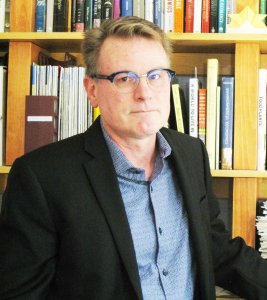Presented By: The Center for the Study of Complex Systems
Complex Systems Seminar | "Using a wetland community-ecosystem model to explore ecosystem interactions and dynamics from a perspective of complex adaptive systems"
William S. Currie, Professor, School for Environment and Sustainability, University of Michigan

The Seminar is presented as part of UM "Earth Day at 50" and the LSA "Great Lakes Theme Semester".
Abstract: In the complexity research community, ecosystems are often considered to be examples of complex adaptive systems. However, complexity researchers often focus on species interactions in a community but exclude phenomena that ecosystem scientists view as central, such as carbon balance, water flows, and nutrient cycling. Ecosystem process models can provide a bridge between these fields. These models capture and represent our scientific understanding of ecosystem processes and their complex interactions and responses to external drivers. Some of these models also include the dynamics of individual species. In this seminar the Mondrian model will be examined, a community-ecosystem model of Great Lakes coastal wetlands developed by Currie and others here at Michigan. Model results and behavior will be examined from a perspective of complex adaptive systems. Mondrian is a complex, individual-based model that simulates thousands of individual plants of four species and their spatially-explicit competition, while strongly coupling the plant species functionality and competition to balanced ecosystem-level fluxes of carbon and nitrogen as well as water flows through a wetland. The model will be used to examine emergence and in nutrient cycling and community dynamics and to test hypotheses related to attractor behaviors in these variables on a range of time scales. The seminar will also touch on applied questions that the Mondrian model is used to address in coastal wetlands including nutrient retention, carbon storage, biodiversity and invasive plant species.
Abstract: In the complexity research community, ecosystems are often considered to be examples of complex adaptive systems. However, complexity researchers often focus on species interactions in a community but exclude phenomena that ecosystem scientists view as central, such as carbon balance, water flows, and nutrient cycling. Ecosystem process models can provide a bridge between these fields. These models capture and represent our scientific understanding of ecosystem processes and their complex interactions and responses to external drivers. Some of these models also include the dynamics of individual species. In this seminar the Mondrian model will be examined, a community-ecosystem model of Great Lakes coastal wetlands developed by Currie and others here at Michigan. Model results and behavior will be examined from a perspective of complex adaptive systems. Mondrian is a complex, individual-based model that simulates thousands of individual plants of four species and their spatially-explicit competition, while strongly coupling the plant species functionality and competition to balanced ecosystem-level fluxes of carbon and nitrogen as well as water flows through a wetland. The model will be used to examine emergence and in nutrient cycling and community dynamics and to test hypotheses related to attractor behaviors in these variables on a range of time scales. The seminar will also touch on applied questions that the Mondrian model is used to address in coastal wetlands including nutrient retention, carbon storage, biodiversity and invasive plant species.